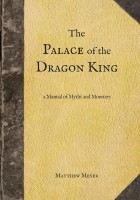Не буди спящего дракона, Странник — он уже поел.
Bestiary.us
энциклопедия вымышленных существБыстрый переход
- Средиземье Средизе́мье (англ. Middle-earth, буквально Среди́нная земля́, также существуют варианты перевода Среднеземье, Средьземелье) — одна из первых и самых известных фэнтези-вселенных. Оно является местом действия основных произведений Дж.Р.Р.Толкина, а также «вольных продолжений» других авторов.
- Городские легенды Cовременная разновидность мифов, как правило, короткие, и, на первый взгляд, правдоподобные (хотя обычно не соответствующие действительности) истории, опирающиеся на современную техническую и общественную реальность, обычно затрагивающие глубинные проблемы и страхи современного общества.
- Портал им.Киплинга Собрание сказок, поэтически объясняющих происхождение той или иной особенности животных, например "откуда у верблюда горб", "почему у слона длинный хобот", или "с чего б это вдруг кошки и собаки не ладят".
Matthew Meyer "The Palace of the Dragon King: a Manual of Myths and Monsters" — 2024 (1711)
Название
The Palace of the Dragon King: a Manual of Myths and Monsters
Авторы

Japan is a nation spread out over fourteen thousand islands, so it is no surprise that its relationship with the sea is embedded deeply within its legends and folklore. According to mythology, the islands of Japan emerged from the depths of the primordial sea when the first gods stirred the waters with a spear. This illustrates the importance of the ocean to the development of Japan as both a country and a culture. It is a force that birthed and has sculpted its landscape, influenced its history, and inspired its imagination.
Yōkai — spirits and monsters found in Japanese folklore — reflect the complex relationship between Japan and the sea over its long history. The sea has served as a conduit for cultural exchange with continental Asia while also isolating Japan and allowing it to foster a distinct national identity. It has acted as both a protective barrier, shielding Japan from foreign invasion, and a destructive force, unleashing devastating tsunamis upon its shores. It is a vital source of sustenance, providing fish and seaweed that sustain the nation’s diet, yet it is also a realm of mystery and danger. These aspects are reflected in the number and diversity of aquatic yōkai. Some are playful, others are deadly; some grant wishes, others destroy; some bring terrible curses, and others provide divine protection.
This manual contains over 100 illustrated entries divided over five chapters that cover a wide variety of Japanese spirits, with a heavy focus on aquatic yōkai and maritime myths. Each creature is described in detail, including its habitat, diet, origin, and legends based on translations from centuries-old Japanese texts.
Год издания
2024
Название серии
Yokai Book
Том
5
ISBN
B0DMCJGXVK
Язык
Английский
Изображения из данного источника
Читать онлайн

Культурно-географическая классификация существ:
Культурна-геаграфічная класіфікацыя істот:
Kulturalno-geograficzna klasyfikacja istot:
Культурно-географічна класифікація істот:
Cultural and geographical classification of creatures:
Comments
Отправить комментарий